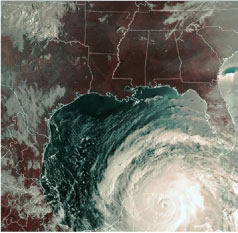
NCI Support Helps Researchers Recover from Hurricane Katrina
 Two years ago, when Hurricane Katrina slammed into the Gulf Coast, the whole world saw the devastation to New Orleans and the surrounding region - the submerged streets, the flooded houses, the gaping levees. Less obvious, however, was the destruction of laboratories where hundreds of researchers were carrying out investigations into cancer and other diseases.
Two years ago, when Hurricane Katrina slammed into the Gulf Coast, the whole world saw the devastation to New Orleans and the surrounding region - the submerged streets, the flooded houses, the gaping levees. Less obvious, however, was the destruction of laboratories where hundreds of researchers were carrying out investigations into cancer and other diseases.
"Right after Hurricane Katrina, NCI organized a rapid response to try to place dislocated investigators and provide disaster relief supplements to allow investigators to rebuild their labs as quickly as possible," says Stephen White of NCI's Division of Cancer Biology and the Hurricane Katrina Relief coordinator for the Institute. "This was complicated by damaged communications lines and the displacement of many researchers and their laboratory employees. But, within a couple of weeks, NCI program directors had managed to locate and contact nearly all of our grantees and offer help and support."
Some researchers were hit harder than others, depending on their location. Some institutions lost electricity and suffered structural damage; the contents of freezers and incubators were rendered unusable. Other labs were completely flooded, resulting in the loss of equipment, cell lines, tissue samples, and data. In some cases, investigators were not able to enter their labs for 3 to 6 months because of mold and other contamination left by the storm.
NCI initially asked grantees to submit brief requests for relief funds as soon as they were able to determine the extent of losses and estimate immediate needs. Relief funding supported the replacement of supplies, reagents, chemicals, assay kits, lab ware, cell lines, animals, small equipment replacement and repair, computers and software, contracts for samples and databases, and patient enrollment costs.
NCI also established a policy on how to respond to requests and allocate resources. An award of $1 million was made to the Louisiana Cancer Research Consortium and distributed equally between the Tulane University and the LSU Cancer Centers to support the replacement of lost equipment. Investigators holding grants with multiple years remaining were given initial supplements to recover immediate losses to their labs and the opportunity to request project extensions at the end of their project period, if needed.
"Within 6 months after the hurricane, we had heard from and responded to nearly all of our affected investigators," continues Mr. White. "In FY06 we made 29 relief supplements to active grants totaling about $4 million. For FY06 and FY07 combined, NCI has provided 37 relief supplements totaling $4.95 million."
NCI provided relief funds to grantees at Tulane University, LSU Health Science Center, University of South Alabama, Loyola University New Orleans, and Ochsner Clinic Foundation, and awarded a supplement to a contract with the Louisiana Tumor Registry.
Several grantees moved to new institutions in other states. NCI expedited transfers to these institutions and ensured that relief funds were distributed as quickly as possible.
"It's impossible to calculate the total damage resulting from Katrina," says Mr. White. "I'd say that many investigators lost at least a full year of research. The loss of basic and clinical data was phenomenal, but most of the investigators were able to resume their work either in New Orleans or in another city. I'm glad that NCI Director Dr. John Niederhuber, the Executive Committee, and other NCI staff were able to help them to do that and continue to support the recovery effort."
By Barbara Cire |